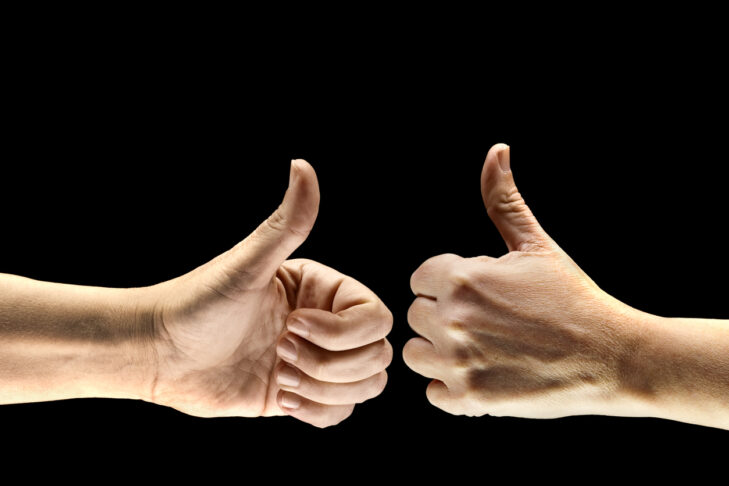Recently, I’ve been attending meetings for local leaders—politicians, civic leaders and clergy—regarding how to respond to the coronavirus in our organizations, houses of worship and large communal gatherings.
Here’s what I learned:
I learned that you are NOT to shake hands. It was hard to miss at one of the churches where we gathered, clearly posted on the front door: “We don’t shake hands here.”
No words of welcome, blessings or encouragement; just that we don’t shake hands, which pretty much set the tone for this leadership event.
Inside I began schmoozing my way around the room, introducing myself to everyone, trying to add something positive onto the end of that sign’s message. So, instead of shaking, I tried the following:
“Namaste” with prayer hands and a slight bow. (Note to self: Politicians don’t seem to dig Sanskrit greetings.)
I tried the Japanese bow (quite lonely when done alone).
I did the “power to the people” fist (this one was a bit much for the conservatives amongst us).
I pulled out the old thumbs-up and got a little carried away with the double thumbs-up (an ode to The Fonz minus the “Hey,” although it couldn’t have been worse than the namaste routine).
I did the elbow bump (pretty much into thin air as very few wanted to touch toxic elbows).
And lastly came the fist to the heart double-thump, “Love and peace, my brother and sister” (which the Bernie crowd loved; the Trumpers not so much).
Then it dawned on me; I was alone in making introductions.
Damn, I thought, I must have missed the sign that read: “We don’t introduce ourselves here. Don’t inquire about one another’s well-being, certainly not during a time of emergency, panic and fear.”
Look, I get it. It’s a virus. It’s contagious. People are dying (just like they do every Wednesday and every time there’s an influenza epidemic); still, there have been deaths and probably will be more.
Yes, we need to be conscientious, take precautions and wash our hands. (I learned that too; we actually had a demonstration. I’m not sure what was more riveting—the play-by-play of scrubbing under the nails or watching our leadership take notes.)
But that’s not the only thing we need from politicians, clergy and local leaders, or from each and every one of us, during this hour of fear.
The Only Thing We Have to Fear
We need to remember that there is something else at stake with this virus, or any virus, or any natural disaster, or after an act of terror. Just as consequential as the terror (and I do not equate this with an act of terror, but there is a palpable terror in the air, to be sure) is what the terror produces: terrified people.
Long after the coronavirus has come and gone, you and I will still be here, and so will the terror, if we are not awake, aware and on guard against the fear. Because neither vaccines, nor face masks, nor a bathtub full of hand sanitizer, will eliminate the terror once it has taken root within the host organism of our psyche, our soul and our society. When the virus has run its course, the terror will remain. To live in a constant state of fear, and to feel terrified when there’s nothing left to fear, is the greatest threat of all.
So, let’s rewind and do the leaders’ gathering again.
Here’s what leaders should have modeled, and every one of us needs to convey to our leaders, to embody in our organizations, to demonstrate in our institutions, to sermonize in our homes, and to live out in the streets:
Signage redux. “Welcome home to your spiritual home. As a precautionary matter, we encourage you to introduce yourself to one another, inquire about each other’s well-being and, as an act of love, do the double thumbs-up Arthur Fonzarelli ‘Heeeeyyyyy’ to scare the fear away.”
Program redo. Open with some prayer. Set the intention of mindfulness. Invoke and evoke a sense of courage, camaraderie and community. Finally, something that can unite us across religions, denominations, even party lines. Tell us, “We will get through this. We are not alone. You are not alone. Take my hand. (Nope. Just testing you!) We are in this together.”
Conversation redo. Yes, let’s talk about what we need to do and not do, and then let’s live our lives focusing on all the good stuff, all the important stuff, all the stuff that doesn’t have “antibacterial” written around it. Talking about the germs, arguing over the wipes and obsessing over the virus only impacts us, not the virus. Let’s take back our power and leave the obsession behind.
Introductions rethought. Lastly, even if we can’t shake, or hug, or have human contact, ESPECIALLY if we can’t do these things, let’s go above and beyond and SHOW UP. Showing up in the way we think. Showing up in the way we talk. Showing up in the way we act.
When All Is Said and Done, Show Up
Show up for family.
Show up for friends.
Show up for strangers.
Show up for people, period.
Show up through literally showing up and checking on others.
Show up through opening doors, inviting them in, going above and beyond in welcoming gestures to cancel out the temporary unwelcoming distance we have to keep.
Show up through comforting people’s fears, alleviating their worries or redirecting their attention and the conversation to all that is right and beautiful and good in their life, in our society and in the world.
Show up, even if you yourself are feeling lost and afraid. Show up like the man in the old tale told by Rabbi Chaim of Zenz, a tale made for a time like this:
A man is lost in the forest. He’s been wandering for many days and nights and can’t find the way out. Finally, he sees another man and says to him, “My friend, I’m really lost. I’ve been searching for the path out of here for many days. I don’t know where it is. Can you show me the way out?” The second man answers: “I, too, am lost. But I can tell you this: Don’t go the way I’ve gone, because it doesn’t lead anywhere. Brother, take my hand. Let’s search for the way out together. And so the two men walked out of the forest hand in hand.
Even if you are a lost and lonely wanderer in the forest, show up for someone more lost and lonely than you. Show up for them and walk with each other (albeit at a safe distance with no personal contact, and a boatload of hand sanitizer, of course), in courage, in companionship and in a commitment to putting an end to this virus—the virus of fear.
May we all be blessed with health.
May those who are ill with this virus, or any illness, be blessed with renewed strength.
And may we all be blessed to show up for others and have others show up for us—virus or no virus. That is why we are here.
This post has been contributed by a third party. The opinions, facts and any media content are presented solely by the author, and JewishBoston assumes no responsibility for them. Want to add your voice to the conversation? Publish your own post here. MORE



